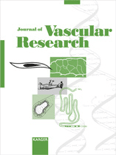
JOURNAL OF VASCULAR RESEARCH
Scope & Guideline
Pioneering insights in cardiology and physiology.
Introduction
Aims and Scopes
- Vascular Biology and Physiology:
Research examining the fundamental mechanisms governing vascular function, including endothelial cell behavior, vascular smooth muscle dynamics, and the role of the extracellular matrix. - Pathophysiology of Vascular Diseases:
Investigations into the mechanisms and progression of vascular diseases such as atherosclerosis, hypertension, and vascular complications of diabetes. - Innovative Therapeutic Strategies:
Exploration of novel therapeutic approaches to manage vascular diseases, including pharmacological interventions, gene therapy, and regenerative medicine. - Microcirculation and Hemodynamics:
Studies focusing on microvascular function, blood flow dynamics, and the implications of these factors in systemic health and disease. - Translational Research:
Research that bridges laboratory findings with clinical applications, aiming to improve diagnostic and treatment strategies for vascular conditions.
Trending and Emerging
- Microvascular Health and Disease:
Increasing emphasis on understanding microvascular function in various diseases, particularly diabetes and obesity, highlights the importance of microcirculation in overall vascular health. - Inflammation and Vascular Disease:
Research exploring the role of inflammatory processes in vascular pathology is gaining traction, linking systemic inflammation to various vascular conditions. - Personalized Medicine in Vascular Care:
Emerging studies are focusing on tailored therapeutic approaches, utilizing genetic, epigenetic, and biomarker insights to inform treatment strategies for vascular diseases. - Technological Innovations in Vascular Research:
The integration of advanced imaging techniques and computational modeling in vascular studies is becoming more prevalent, facilitating better understanding of vascular dynamics. - Regenerative Medicine and Tissue Engineering:
There is a growing interest in regenerative approaches, including stem cell therapy and tissue engineering, to repair or replace damaged vascular tissues.
Declining or Waning
- Traditional Atherosclerosis Models:
Research utilizing older animal models for studying atherosclerosis has decreased as newer, more relevant models emerge that better mimic human disease. - Basic Studies on Endothelial Dysfunction:
While foundational, studies focusing solely on endothelial dysfunction without exploring broader implications or therapeutic strategies have become less frequent. - Single-Parameter Studies:
There is a noticeable decline in publications that investigate single parameters in vascular function, as the field shifts towards more integrative and multifactorial approaches.
Similar Journals
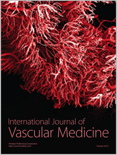
International Journal of Vascular Medicine
Enhancing Understanding of Vascular DiseasesThe International Journal of Vascular Medicine is a peer-reviewed, open access journal dedicated to advancing research and knowledge in the field of vascular medicine. Published by HINDAWI LTD and operating since 2010, this journal provides a platform for the dissemination of high-quality studies, reviews, and case reports related to cardiovascular health. Based in Egypt, the journal's comprehensive scope encompasses a range of topics within cardiology and cardiovascular medicine, with a current impact factor reflected by its Q3 ranking in 2023, positioning it among the noteworthy publications in its category. With a Scopus rank of 176 out of 387, the journal maintains a significant presence in the academic community, supported by a commitment to open access, ensuring that research is freely available to all stakeholders. Researchers, professionals, and students alike are encouraged to contribute to and engage with the International Journal of Vascular Medicine as it enhances the understanding and treatment of vascular diseases and promotes innovative practices within the field.
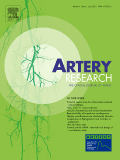
Artery Research
Fostering collaboration to transform cardiovascular medicine.Artery Research is an esteemed open access journal published by BMC in the United Kingdom, dedicated to advancing the field of vascular biology and cardiovascular medicine. Since its inception in 2006 and transitioning to an open access format in 2019, the journal has become a pivotal platform for disseminating high-quality research on arterial health, pathology, and the latest clinical advancements. With an impactful focus on anatomy, cardiology, and physiology, Artery Research holds a notable reputation within the global research community, ranked in the Q3 and Q4 category quartiles in its respective fields and reflected in its Scopus ranks. The journal aims to foster collaborations and discussions among researchers and practitioners by providing an accessible avenue for publishing pivotal findings and insights. As it continues to evolve through 2024 and beyond, Artery Research remains committed to enriching cardiovascular research and driving innovations toward better health outcomes.

Vascular Health and Risk Management
Unveiling critical research to elevate patient care standards.Vascular Health and Risk Management is a leading peer-reviewed journal published by DOVE MEDICAL PRESS LTD, focusing on the critical areas of cardiology, endocrinology, and public health. With an impact factor that reflects its significance within the scientific community, this Open Access journal, established in 2005, has been committed to enhancing knowledge on the interplay between vascular health and various risk factors affecting patient outcomes. The journal is proudly based in New Zealand and is indexed across multiple categories, maintaining a prominent Q2 ranking in cardiology, endocrinology, diabetes, and several other medical disciplines as of 2023. By providing a platform for innovative research and comprehensive reviews, Vascular Health and Risk Management seeks to foster collaboration among healthcare professionals, enhance clinical practices, and ultimately improve patient care through rigorous scientific inquiry and disseminated knowledge. Researchers, professionals, and students will find invaluable insights that inform their work and advance the understanding of vascular-related health issues.
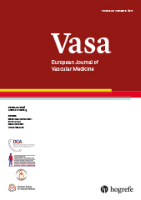
Vasa-European Journal of Vascular Medicine
Fostering Insights in Cardiovascular Health and PracticeVasa - European Journal of Vascular Medicine is a leading peer-reviewed journal dedicated to advancing the field of vascular medicine, published by HOGREFE AG in Switzerland. With a proud history dating back to 1972, this journal serves as a critical platform for researchers, clinicians, and healthcare professionals committed to enhancing knowledge and practice related to cardiovascular health and vascular disorders. Holding a notable Q2 ranking in the cardiology and cardiovascular medicine category, Vasa’s scholarly contributions reflect high-quality research and innovative insights that drive clinical applications. The journal provides essential access to original articles, reviews, and case studies, fostering a vibrant exchange of ideas within the vascular medicine community. Its Scopus rank of #159 out of 387 further underscores its impact, placing it confidently in the 59th percentile among its peers. Vasa is synonymous with rigorous academic standards and relevance, making it an invaluable resource for anyone seeking to stay at the forefront of vascular research and its clinical implications.

CLINICAL HEMORHEOLOGY AND MICROCIRCULATION
Unlocking the Secrets of Hemorheology for Better HealthClinical Hemorheology and Microcirculation, published by IOS Press, is a distinguished journal dedicated to advancing the scientific understanding of blood flow mechanics and microcirculatory phenomena. Since its inception in 1991, the journal has been pivotal in bridging the fields of cardiology, hematology, and physiology, as evidenced by its placement in the Q3 quartile across several categories in 2023. Positioned in the vibrant academic landscape of the Netherlands, Clinical Hemorheology and Microcirculation offers valuable insights to researchers and practitioners alike, enriching their knowledge and fostering innovation in clinical practices. With an ISSN of 1386-0291 and an E-ISSN of 1875-8622, the journal serves as a vital platform for disseminating high-quality research and reviews that explore the intricate dynamics of blood viscosity and microvascular function, essential to both health and disease. As readers delve into the journal, they will access rigorous studies that not only enhance theoretical understanding but also pave the way for potential clinical applications, making it a crucial resource for those invested in the future of cardiovascular and hematological research.
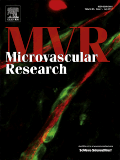
MICROVASCULAR RESEARCH
Uncovering the Secrets of Microvessels in Health and DiseaseMicrovascular Research is a prominent journal dedicated to advancing the understanding of microvascular biology and its implications in various health and disease contexts. Published by Academic Press Inc elsevier Science, this journal holds a significant place in the academic community with an impact factor reflecting its high citation frequency and relevance within its fields. With a Q2 ranking in both Biochemistry and Cardiology and Cardiovascular Medicine, as well as a Q3 ranking in Cell Biology, it provides an essential platform for researchers and professionals to publish and access groundbreaking studies. Established in 1968 and running through to 2025, Microvascular Research covers a broad scope, focusing on various topics related to microvessels and their functions, emphasizing the importance of these structures in health and pathology. Although the journal does not offer open access, it remains a vital resource for those seeking to deepen their understanding of microvascular dynamics, making it an essential addition to the libraries of researchers, clinicians, and students alike.

Indian Journal of Vascular and Endovascular Surgery
Empowering Surgeons with Evidence-based InsightsThe Indian Journal of Vascular and Endovascular Surgery, published by Wolters Kluwer Medknow Publications, serves as a premier platform dedicated to advancing research and clinical practices in the fields of vascular and endovascular surgery. With an E-ISSN of 2394-0999 and a commitment to open access since 2015, this journal provides invaluable insights to researchers, professionals, and students alike, fostering a collaborative environment for the dissemination of knowledge. By focusing on innovative techniques, case studies, and systematic reviews, the journal plays a vital role in enhancing clinical outcomes and promoting evidence-based practices within the vascular community. Its commitment to high-quality research and accessibility positions it as an essential resource in the landscape of surgical literature, encouraging further exploration and collaboration within this critical area of healthcare.

Stroke and Vascular Neurology
Elevating the standards of vascular neurology.Stroke and Vascular Neurology is a premier open access journal published by BMJ PUBLISHING GROUP, dedicated to advancing the field of vascular neurology and cardiology. With an ISSN of 2059-8688 and an E-ISSN of 2059-8696, the journal has established itself as a leading platform for disseminating cutting-edge research since its transition to open access in 2016. Based in the United Kingdom, at BRITISH MED ASSOC HOUSE, TAVISTOCK SQUARE, LONDON WC1H 9JR, ENGLAND, the journal's outstanding reputation is reflected in its Q1 rankings in both Cardiology and Cardiovascular Medicine and Neurology (clinical) for 2023, placing it in the top tier of its categories. With Scopus rankings of 28 out of 387 in Cardiology and 30 out of 400 in Neurology (clinical), both within the 92nd percentile, Stroke and Vascular Neurology serves as an essential resource for researchers, clinicians, and students looking to stay at the forefront of advancements in the management and understanding of stroke-related disorders. The journal's commitment to high-quality research contributes significantly to improving patient outcomes and shaping the future of vascular health.

ANNALS OF VASCULAR SURGERY
Elevating Clinical Practices with Groundbreaking ResearchANNALS OF VASCULAR SURGERY is a premier journal published by Elsevier Science Inc, focusing on the rapidly evolving field of vascular surgery and its related disciplines. With a notable impact factor reflected in its 2023 Q2 rankings in Cardiology and Cardiovascular Medicine, as well as in Medicine and Surgery, this journal stands out as a reputable source for cutting-edge research and clinical practices. Since its inception in 1986, it has aimed to advance knowledge, foster innovation, and enhance surgical techniques through comprehensive reviews, original research articles, and clinical trials. Although not currently adopting an open access model, the journal continues to serve as a crucial repository of information for researchers, clinicians, and students, facilitating the dissemination of clinical and scientific advancements in vascular health. As it converges through the years towards 2024, the ANNALS OF VASCULAR SURGERY is poised to remain a valuable resource for the global medical community.
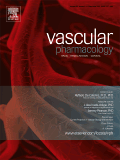
VASCULAR PHARMACOLOGY
Advancing vascular health through innovative pharmacology.Vascular Pharmacology, published by Elsevier Science Inc, is a leading journal in the fields of pharmacology and molecular medicine, dedicated to advancing our understanding of vascular biology and therapeutic interventions. With an impressive impact factor reflecting its significant contribution to the scientific community, this journal seeks to publish ground-breaking research that elucidates the molecular mechanisms underlying vascular function and disease, as well as the pharmacological impact of new therapeutic agents. The journal operates under a dual access model, allowing for both subscription and open access options, ensuring that vital research is accessible to a wide audience. As of 2023, it holds a prestigious position in the Q1 category for pharmacology and ranks well in molecular medicine and physiology, reflecting its high quality and relevance. Whether you are a researcher, clinician, or student, Vascular Pharmacology serves as an essential resource to stay at the forefront of cardiovascular pharmacotherapy and vascular biology.